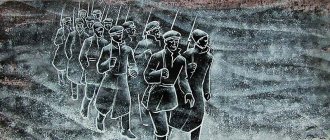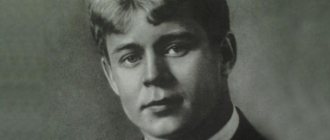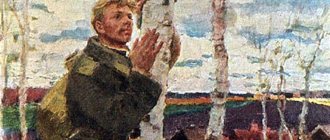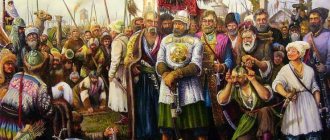The image of Vasily Terkin in Tvardovsky’s poem of the same name is a cheerful, brave soldier who defends his homeland from the Germans. Read more in the article.
Vasily Terkin from the work of the same name, which was written by Alexander Tvardovsky , is a gallant soldier and a true patriot. He is brave and will always go into battle for his homeland. But besides this, in the work the soldier lives his own life. In this article you will find a description of the images of Vasily Terkin, as well as other characters of Tvardovsky. Such information is suitable for writing essays, performing reports and presentations.
In Russian literature there are many other images associated with military actions and exploits. For example, the character of the work “The Captain’s Daughter” Pyotr Grinev or the image of Napoleon Bonaparte from the epic “War and Peace” .
“Vasily Terkin” Alexander Tvardovsky - the image of the author in the poem: an essay briefly by verse
The image of the author in the poem
The image of the author can even be traced in this work. Without this, the poem would not be so interesting. The image of the author in the poem “Vasily Terkin” by Alexander Tvardovsky - a short essay on the verse:
The narrator occupies an important place in the work. The same as the image of the main character himself. Tvardovsky is somewhat autobiographical. The writer acts as an intermediary between Terkin and the reader. Moreover, there are chapters “About myself” and “From the author” . Their task is to complement the composition, structure the verse, and connect the chapters with each other.
It is worth noting that the author’s speech is quite sincere and lyrical. It seems to smooth out the realities of wartime. Sometimes Tvardovsky refers to both animate and inanimate objects:
- Overcoat
- Motherland
- Projectile
- Heart
- Enemy
- Fighting girlfriends
In some ways, the author is also the hero’s double, this can be seen in the following lines:
- “And I’ll tell you, I won’t hide it”
- “In this book, here and there, I personally say what the hero should say.”
Already in the second part of the work, the author’s words are written in the first person. The narrator plays the main role. He accompanies the main character until the end of the poem.
Analysis of the poem "Vasily Terkin"
History of the work
The name of the main character of the poem was born on the editorial board of the Leningrad newspaper “On Guard of the Motherland.”
Vasily Terkin was invented as the central character of small feuilletons. However, after some time, the hero “grew” out of the size of small poems, and Tvardovsky decided to create a work that was more suitable in scale to the character - a poem. The first chapters of the work were created and published in 1942. The author created the poem over the course of three years, so the work was published in the newspaper in parts. Readers loved Terkin’s story so much that when the poem was finished, Tvardovsky began to receive many letters asking him to create a continuation of the work.
The idea for the history of a soldier of the Great Patriotic War came to Tvardovsky at a time when the author himself participated in hostilities - he was a war correspondent in the Russian-Finnish war. Real military events formed the basis of the poem: the battle on the Volga, the crossing of the Dnieper River, the capture of Berlin.
Theme and genre
An analysis of the poem “Vasily Terkin” can begin with an analysis of the theme of the poem. The author made his choice in favor of the life of soldiers, where there is a place not only for the terrible events of war, but also for humor and optimism. It is noteworthy that there is no ideological background in the poem. There was considerable pressure on Tvardovsky from the authorities - the author should have touched upon the topic of political party significance in the story, its contribution to victory. But politics would have destroyed the overall tone of the work, and the author managed to defend his position and not include “ideological lines” in the poem.
Even without the “political lines,” the poem was successfully published in all major publications, such as Pravda, Izvestia and Znamya. The popularity of the poetic hero grew, the lines were recited on the radio, read out to front-line soldiers, and even given gift editions as a reward for military distinction.
“Vasily Terkin” tells about simple and important military moments: faith in the triumph of justice and victory, the heroism of ordinary soldiers, the strength of the Russian spirit. The ordinary soldier Vasily fell in love with the readers so much that he almost became a real person. People believed that such a guy really lived somewhere and that someday they would be able to see him and shake his hand. Terkin became not only a warrior, but also a friend for the reader, his comrade in arms. Cheerful disposition, optimism, exploits - all this became a real moral support for the fighters. The main idea of the poem - to believe in victory and not stop fighting - was relevant for real warriors. Tvardovsky would not have been able to express this idea so vividly and truthfully if the author himself had not gone through the war.
Literature. 8th grade. Toolkit
This manual is intended for teachers working according to T. F. Kurdyumova’s program for schools (grades 5-9); corresponds to the Federal State Educational Standard for basic general education. The book provides new approaches to the study of traditional topics.
Buy
To fully analyze the work “Vasily Terkin”, it is important to determine the genre. Tvardovsky assessed the genre of his work as a “book about a fighter,” because his work did not fit into the classical canons of the poem. Nevertheless, “Vasily Terkin” is a poem. Yes, the poem is special, touching on problems of colossal proportions, extremely original and immortal.
Characters and composition
Structurally, the work consists of 30 chapters, a prologue and an epilogue. The narrative is not “tied” to any specific dates in history, nor to any specific geographical coordinates. The described actions take place during the Great Patriotic War on front-line roads. It was precisely this commonality of time and place that made Terkin’s image universal - such a soldier could serve in any part of the country, at any moment in wartime. In the words of the author: “War has no plot,” but there is a beloved immortal hero.
The composition of the poem is special in that it incorporates stories connected with each other by the image of the central character. A distinctive compositional point is the presence of dialogues between the author and the hero.
Each chapter of the work is completed and can be considered a separate poem from the entire poem. This unusual interconnection of parts is explained very simply - the chapters were published separately, and readers could skip the previous or subsequent part.
When analyzing the poem “Vasily Terkin”, it is necessary to devote time to the central character of the work. Who is this Terkin? Vasily is an ordinary peasant from near Smolensk, serving as a private in the infantry, but thanks to his heroic exploits he received a military order. Terkin is not a specific soldier-hero, he is an image of a Russian man, a strong character, an optimistic warrior who, among military battles, managed to find and show, where necessary, sentimentality, fortitude, the will to win, and the ability to look at life positively. This is a joker soldier, however, first of all, he is a warrior, which means he fights for human life and the freedom of his homeland. Like any living person, Vasily has shortcomings and is even afraid of death. But it is precisely this “humanity” that makes Terkin’s image immortal.
When we first meet the hero, we learn that Vasily is an “ordinary guy.” His external characteristics are stingy: he is not endowed with “excellent beauty”, “not tall, not that small.” This “blurred” appearance also contributes to the generalization of Terkin with a simple Russian soldier. However, he also has unique features - the hero is practically invulnerable, he is unharmed “under oblique, three-layer, under mounted and direct fire.” Of course, the warrior gets injured, but he heals quickly. And in battle he is helped by his faithful comrades. Terkin was wounded in the arm, but tank crews saved him from certain death. And having been wounded in the leg, the warrior found salvation in the person of the funeral team.
The second chapter, “From the Author,” is interesting because Terkin appears in it in two forms at once: both as a real soldier who has seen a lot in his life, and as a literary character whose fate is to outlive the author himself.
It is no coincidence that the hero’s surname has become “talking”. Terkin has a sharp tongue, like a grater, but he still literally grinds down all the difficulties in his path. “We will endure, we will endure” is the motto of the hero and the entire Russian people as a whole.
Terkin is not the only hero on the pages of the poem. Many, albeit nameless, characters perform feats and heroic deeds. So, the rescuers are the tank crews, the commander who chopped wood for his family in his free minute for rest, the grandfather and woman who saw off and greeted the Russian troops.
The Russian woman in the rear also has a strong character. She not only meets her husband, but also his comrades, sees off her own son to battle, writes optimistic letters to her husband at the front to support him in difficult times. This woman, like Terkin, is not a specific character, but an image of every Russian mother and wife. She receives rewards for her love and difficulties - this is not an order, no, it is a horse, a feather bed, a cow, a lamb. For a woman who shouldered all the burdens of family life during the war, these awards became much more valuable and useful than any medal.
Ordinary girls - friends of fighters - also deserve special mention. With the beginning of the war, the soldiers left their girls, but being with them is the best reward for a young military man. Thus, Terkin, who was saved by a hat given to him by an unknown nurse, wants to show her his imaginary medal.
What else should I read?
Oral interview in 9th grade: practice preparation
Essay-reasoning: writing algorithm
EER in Russian language
Set of cards “True Accents”
The enemies of our troops also act as a separate motive. They are not shown in as much detail as the main character or Russian ordinary people, but Tvardovsky describes some more specifically. For example, we learn more about the German fighting Vasily hand-to-hand. This unknown German also becomes the image of all Germans in the war: he is well-fed, well-groomed, and takes care of himself. But in this case, all these essentially good human qualities cause disgust, a feeling of disgust and indignation. Other enemies are worthy only of pity and laughter, but not of fear or respect.
Inanimate objects also become special heroes of the poem. These are things that always accompany or come across on the hero’s path: an overcoat, an accordion and pouch, a bathhouse, food and water.
Main thought
When analyzing “Vasily Terkin,” one cannot forget to mention the main idea of the work. The main leitmotif of the poem is the righteousness of the battles for the life and freedom of one’s homeland, the holiness of this struggle. In such an ongoing struggle, people like Terkin are needed. These are warriors who are capable of not only repelling an insidious enemy, but also resilient in the face of difficult life situations, fighters filled with patriotism and faith in victory.
Observing the principle of reality, the author does not always make Terkin the central character; sometimes Vasily fades into the background. The poem contains lyrical digressions, internal monologues, and reasoning by the author and characters.
Since Tvardovsky created his work in a military situation, the development of events in the poem corresponds to the course of the war: first a retreat, then an attack on the enemy and, finally, the movement of our troops to the West.
At the same time, the “course” of the central character’s life is shown:
- the part “At a Rest” tells how the hero found himself in his unit;
- the chapter “Before the Battle” talks about Vasily’s escape from encirclement;
- analysis "Vasily Terkin" "Crossing" reports on the heroic, but unaccounted feat of the hero,
- part “Terkin is wounded” - about the wounding of a warrior and his salvation,
- the chapter “Duel” shows a scene of a hand-to-hand fight with the enemy,
- "Who shot?" reveals the feat of a hero who managed to shoot down an airplane with a rifle,
- the “General” part talks about presenting an award to a fighter,
- “The Battle in the Swamp” tells about the capture of the “Borki” point, which lasted for long days,
- chapter “On the offensive” - about Terkin’s command of the platoon during the offensive after the death of the commander,
- the part “Death and the Warrior” reports about Vasily’s dangerous wound in the leg,
- and finally, the chapter “On the Road to Berlin” talks about Terkin’s progress from the border to Germany.
The work does not have a final completed plot; each part is plotted and compositionally designed and completed. Each chapter carries its own thought and reveals a moral, because readers may not read the continuation of the poem. In addition, some chapters stand out from the rest: some of them are plot poems, others are lyrical poems, and others are a heroic ballad.
Russian language. Appendix to the textbook. 8th grade. Application
The Application tab includes spelling and punctuation rules learned in grades 5-8; educational dictionaries, educational instructions (algorithms for various types of linguistic analysis, recommendations for preparing for dictations, presentations) and project assignments.
Buy
Tvardovsky “Vasily Terkin”: analysis. Stanzas, meter and rhyme
The peculiarity of the construction of the “language” of the poem goes back to the author’s desire to bring the characters’ speech closer to a live conversational one. Almost the entire work is written in trochaic tetrameter. Stanzas have a different number of lines (from 2 to 10). Each stanza expresses a separate complete thought. The rhyme alternates from adjacent to cross. Moreover, individual lines have no rhyme at all or rhyme in three lines.
The vocabulary used in the poem is everyday, replete with colloquialisms.
Even when the hero’s thoughts rise to serious topics, sometimes seeming pathetic, Terkin’s speech remains simple and understandable. #ADVERTISING_INSERT#
History of creation
The main character of the poem - a fictional hero - was invented and named by the editorial board of the Leningrad newspaper “On Guard of the Motherland,” which included, in addition to the author himself, artists and poets. Vasily was supposed to become the main character of small feuilleton poems. However, the character became so popular that Alexander Tvardovsky decided to write a larger-scale work.
In 1942, the first chapters of the legendary poem were written and published. Until 1945, it was published in newspapers in parts; in 1942, the first edition of the poem, still incomplete, was published. Thus, Tvardovsky worked on the poem for three years. It turned out to be so popular that the news that work on it had been completed prompted many letters asking for a continuation of the story about Vasily Tyorkin.
The idea for the poem came to Tvardovsky during the Russian-Finnish War in 1939, when he participated in military events as a war correspondent. The Great Patriotic War, in which the author himself took part, became the impetus for writing a work in which real events are guessed: the battle on the Volga, the crossing of the Dnieper River, the capture of Berlin. In 1942, after participating in the hottest battles, the author returned to Moscow and began work on the poem.
The theme that Tvardovsky chose is multifaceted and diverse; in his work everything is based on humor and optimism - just like in the real life of soldiers in military field conditions. Despite pressure from the authorities for the absence in the poem of references to the significance of the party, its contribution to victory and struggle, the writer did not include ideological aspects in the narrative. They, according to the author, were completely incompatible with the general tone of the work, its idea and goals. Despite the fact that censorship required editing of works, “Vasily Terkin” was republished by all well-known publications (“Znamya”, “Pravda”, “Izvestia”), and its popularity grew. Every schoolchild knew the lines from the poem by heart, it was recited on the radio, read to soldiers at the front, and publications were given as gifts as a sign of special military merit.
Check out what else we have:
The theme of Tvardovsky’s immortal poem can be described as follows: faith in victory, the strength of Russian character, the feat of a simple soldier. The poem tells the story of a simple guy who lives laughing, does not lose heart, believes in victory and holds on to life. His character, humor and exploits became a real legend for the soldiers at the front. People believed that Vasily was a real person, they looked up to him, dreamed of seeing the hero and shaking his hand.
The writer achieved such a “living image” thanks to his front-line experience, artistic means and the power of his talent. The main idea of the work is to believe in victory, to continue to live and fight in any situation, even in the face of death (as Tyorkin does in one of the chapters). Criticism and censorship were dissatisfied with what the poem taught the reader; it was necessary to emphasize the role of the party in defeating the enemy. But the general direction of the narrative, its style and character were alien to ideology, therefore the problems raised in the poem are devoid of partisanship and ideological overtones.
The main character becomes close and dear to the reader, he is a friend, a comrade in arms, a guy from a neighboring company, but not a charismatic leader, not a mentor, not a government servant. Due to controversy and pressure from censorship, Tvardovsky experienced a serious creative crisis in 1942-43, but was able to bypass the prohibitions and realize the original idea of the work.
Option 3
A feat is a selfless, selfless act in the name of people’s lives. In war, not a single day can be erased from life, considered unimportant, insignificant. In war, every day is a feat. Heroism is caused by love for the Motherland, the desire to protect one’s family and friends. This can only be achieved by uniting everyone together. All together and each individually people bring victory closer in the battle with the enemy.
The readiness to do the impossible, to sacrifice life for the sake of the lives of other people, not to hide behind other people’s backs, and to recognize one’s personal responsibility is the feat of a simple Russian soldier. I can confirm this idea with examples from works of art.
V. Kondratyev’s story “Sashka” tells about the everyday life of ordinary soldiers during the Great Patriotic War. The main character is a young soldier fighting on the front line near Rzhev. Several days from his life show daily heroism, the difficulties of everyday life, and the moral problems of soldiers. Sashka did not immediately, but got used to the whistling of bullets, rockets in the sky, tracer bullets. He is used to constantly risking his life. We see that the war did not kill normal human feelings in the hero. He cares about his commander, risking his life trying to get felt boots for him. He does not want to kill a captured German, even after the battalion commander ordered him to be shot. He cannot kill an unarmed person also because in the leaflets the command promised that the lives of the prisoners would be spared. A hero cannot deceive people, even if he is a captured enemy. Realizing that the battalion commander is now out of his mind due to the death of his beloved woman, Sashka violates the order and takes the German to the brigade headquarters. He understands that he is violating the order of the commander, but cannot violate his moral law. The commander, having come to his senses, cancels the order, otherwise Sashka could have been court-martialed. Kindness, compassion, saving people define the essence of Sashka’s feat. He managed to maintain a human face in inhuman conditions.
The same fighter as Sashka is discussed in the poem by A. T. Tvardovsky, which is called “I was killed near Rzhev.” The heroes are united by age, era, perhaps they fought in the same regiment. The poem is a monologue of the lyrical hero. He died in battle and addresses his fellow soldiers who survived. We learn that he is very worried about the outcome of the battle. This is a highly moral person. His character embodied the best features of the Russian person: pride, responsibility, love for the Motherland, self-sacrifice, courage. There are thousands of voices in the hero’s voice; we feel great national unity and equality in this monologue. This is a collective image of all Russian soldiers who died in the battles near Rzhev. Each of them could say the words with which the hero addresses his fellow soldiers and descendants. It is necessary that their death was not in vain. The Russians must recapture Rzhev, they must win this war, “otherwise, even a dead man – how?” The hero does not even think that his comrades are retreating. He assumes that they are already on the border, forcing the enemy to go back. The soldier’s feat is that with his life and death he ensured life and happiness for his descendants. His feat, like the feat of millions of soldiers, became a tragic and heroic part of history at the same time. The living have a sacred duty to preserve the memory of the dead.
To summarize, we can say that the role of ordinary soldiers in war is great. Thanks to their bravery, courage, and perseverance, victory was achieved. Every day they were away from home, away from family. Every day they stood under bullets, sacrificing their lives so that the enemy would not seize their native land, so that their children and grandchildren could live. This dedication is the feat of a simple Russian soldier.
Theme, main idea and composition
A poem about an ordinary soldier Vasily Tyorkin, an infantryman who went through the entire war and reached Berlin. Terkin survived all the hardships of war, was wounded three times and almost died once, was cold and hungry, retreated and went on the attack, but did not show cowardice and was the soul of his platoon, company, battalion. It was not without reason that soldiers wrote letters to Tvardovsky, telling him that Tyorkin was in their platoon. The theme of the Great Patriotic War is life during the war of a simple soldier, the people and the entire Motherland.
The main idea of the poem is the holiness and righteousness of the battle for the life and freedom of the native land. This idea is repeated as a repeated refrain in several chapters. In this righteous struggle at the front and in the rear, in difficult times, such a resilient Tyorkin is very much needed, and every fighter must look within himself for this source of optimism and hope, as well as heroism.
In the poem, individual chapters are loosely connected to each other by plot; not all of them even have a main character, and in some, Vasily Terkin plays a cameo role. As Tvardovsky himself said, these are “poems, but everything is clear.” Thus, epicness is achieved through a broad depiction of human life in war, narration in simple and accessible language. The lyrical elements of the poem are traditional. These are chapters “From the Author”, in which the author describes his attitude to the war, to the hero and to the work. The poem contains landscapes, lyrical digressions, internal monologues that reveal the soul of the characters, and reasoning between the characters and the author.
The subject of the image in each chapter is different. Since Tvardovsky wrote his chapters directly in a military situation, they chronologically correspond to the course of the war (retreat - offensive - victorious movement to the West). At the same time, the chapters chronicle the life of the protagonist during the war. “At a Rest” is about how Tyorkin ended up in his unit. “Before the Battle” is about Tyorkin’s escape from encirclement. “Crossing” is about the unrecorded feat of the hero who swam across the river. “Torkin is wounded” - about Tyorkin being wounded in the arm and being saved by tank crews. “Duel” is about hand-to-hand combat with a German. "Who shot?" — about the feat of Tyorkin, who shot down a plane with a rifle. “General” is about presenting an award to Tyorkin. “Battle in the Swamp” is about the multi-day capture of the settlement “Borki”. “On the Offensive” is about how Tyorkin led a platoon on the offensive after the death of the commander. “Death and the Warrior” is about Tyorkin’s severe wound in the leg. “On the Road to Berlin” is about Tyorkin’s movement from the western border to Germany.
Although the poem as a whole does not have a completed plot, each of the 30 chapters is completed plot-wise and compositionally. Tvardovsky strove to speak out to the end in each and took care of those readers who would not live to see the next chapter. Some chapters are close either to a heroic ballad, or to lyrical poems, or to plot poems.
Analysis of the chapter “Who Shot?”
Chapter "Who Shot?" begins with a description of the landscape, a “wonderful evening”, which belongs not to war, but to peaceful life, and this evening “disturbed” the soldiers who were accustomed to war and now seem to have returned to the peaceful life for which they are fighting. They seem to be transported into this peaceful life, but “with a terrible roar” a German plane appears, which brings death with it, and the pictures of peaceful life recede before the fear of death: “Now you are done for, now you are no longer there.” However, the author, understanding the reasons for this fear, still cannot agree that it is fitting for a Russian soldier to fear death: “No, comrade, evil and proud, As the law tells a soldier, Face death face to face...”. And one of the soldiers responds to his words, who “hits from his knee From a rifle at the plane,” and this “unequal battle, short battle” ends with the German plane crashing into the ground in a “corkscrew!” A magnificent detail: “The shooter himself looks with fear: What did he do by chance”! The chapter ends with Terkin’s words addressed to the sergeant, who said that “the guy is lucky, Lo and behold, the order is out of the bush”: “Don’t worry, this is not the German’s last plane...”, and the author’s humor helps to avoid unnecessary discussions about heroism , about the feat that Tyorkin actually accomplished, and the author shows that the hero’s feat was not that he shot down a plane (this could just have been an accident), but that he was able to overcome his fear and challenge death and defeat it.
Option 4
The feat can be understood in different ways. This can be a single selfless act, or human life can become a feat. The dedication, courage, and strong will shown by the fighters made each of them a hero. The wisdom of the generals commanding the troops matters. And yet, victory in war depends on the ordinary Russian soldier, on the spirit of the entire army. Years spent in war can also be equated to a feat. This can be confirmed by examples from works of art.
The poem “Borodino” by M. Yu. Lermontov tells about the great battle that decided the outcome of the Patriotic War of 1812. An experienced soldier tells a young one about the feat accomplished by ordinary soldiers for the sake of the independence of the Fatherland. Lermontov does not give the narrator a name, by doing this he emphasizes his typicality. There are a majority of people like him in the Russian army. The narrator himself is proud of his comrades. He compares the Russian soldier with a hero. Through his lips the thoughts and feelings of the entire generation are expressed. They retreated for a long time under the onslaught of the French, but he believes that “it was God’s will.” In the battle of Borodino, the Russian army showed unprecedented courage. Russian soldiers attacked the French like a wall; they promised to die, but not to retreat. “And they kept the oath of allegiance,” says the old soldier. Russian warriors showed their enemies their prowess, fearlessness, and courage. Love for the homeland and hatred for the enemy reached their climax on this day. Ordinary Russian soldiers forced the victorious French army to retreat. This event makes us proud of our people, of the Russian army. The willingness to sacrifice their lives and the courage of Russian soldiers can rightfully be considered a feat that all of Russia remembers. Lermontov's hero was mistaken in thinking that the new generation is inferior to the old. The Great Patriotic War showed the invincibility of Russian weapons.
The story “Russian Character” by A. N. Tolstoy talks about the feat of a simple Russian warrior Yegor Dremov. Tolstoy describes his appearance, comparing him with Russian epic heroes. When he was on the tank, the narrator saw in him the god of war, he had such a majestic appearance. He also fought like a hero. For his exploits he received the title of Hero of the Soviet Union, medals and orders. He was called to the front from a small village in the Saratov region. Egor ended up in the tank forces. During the battle, the tank caught fire and the hero received severe burns. The tank driver saves him. After the operation, Dremov’s appearance changed beyond recognition; his appearance became repulsive and ugly. He was given leave to go home. He entered the house, his parents did not recognize him. The hero was never able to tell the old people that he was their son. Only you can’t deceive a mother’s heart. In the letter, his mother asked him to confess. Yegor's great human qualities are manifested not only at the front, but also in his attitude towards his parents and his beloved girl. His modesty does not allow him to talk about how he fought and for which he received awards. All these actions, the whole life of the hero, are a feat, selfless service to people.
To summarize what has been said, I would like to once again emphasize the merits of the soldiers in the outcome of any war. They faced the main difficulties. They were always under enemy fire. The soldiers bravely endured all the vagaries of the weather. They had a huge responsibility for the outcome of any operation, any battle. Victory and the lives of subsequent generations depended on them. They coped with their task, accomplishing their main feat in life. This deserves eternal memory for posterity.
Option 2
Many songs have been written about the exploits of Russian soldiers, many works of art have been written, and many films have been made. Every time we open a book about the war or look with bated breath at the frames of a war film, we admire and are proud of the heroism of our ancestors, Russian soldiers, who endured many hardships in that terrible war and accomplished a real feat. What does it consist of? Let's try to find answers on the pages of our favorite books.
Works by K.D. Vorobyov tell the whole truth about the war. His heroes are simple Russian soldiers, completely different, real. There are among them those who are distinguished by cowardice, but most of all those who were capable of exploits in the name of the Motherland. In my opinion, for a writer, a feat lies, first of all, in the ability to overcome one’s fear. The author talks about the feat of young Kremlin cadets, beardless, unfledged youths who were trained for parades, festive ceremonies and the protection of important Kremlin objects, and were sent to defend the capital from the fascist army. They had to carry out the order in inhumane conditions: there was not enough food, no ammunition, no weapons. In the hands of yesterday's boys there were only Molotov cocktails, a couple of grenades and a rifle against the enemy's strongest tank battalion. It was impossible to retreat: Moscow was behind us, surrendering which meant defeat. Two hundred and thirty-nine Kremlin soldiers laid their heads on the outskirts of Moscow for five days. It was scary to die, but these young guys were real Russian soldiers, heroes who managed to overcome their fear and died, firmly convinced that they had done a good deed by not allowing the enemy to approach the capital.
About the great feat of the Russian soldier, fighter pilot M.P. Devyatayev is told in the story “Escape from Hell”. This book is about incredible courage and desperate courage, about a real incident from the author’s life. During one of the flights, he is captured by the Germans and taken to a concentration camp located on the island of Usedom in the Baltic Sea. They had to survive in the most difficult conditions: nine hundred people in a barracks, hellish hunger, cold, exhausting work. But even in such terrible conditions, anti-fascist work continued; the prisoners continued to support each other as best they could. Devyatayev, thanks to the camp barber, who cut off the badge number from the deceased prisoner and replaced the narrator’s number, remained alive. He ended up serving at an airfield, where he secretly studied the design of German aircraft, panel instruments, and bomber designs. Even then, he planned to escape on one of the fighters to get to his homeland. This thought haunted him day and night, he prepared for it and was finally able to carry out his plan. On the German Heinkel bomber, ten Russian prisoners of war were able to reach their homeland, performing an incredible feat that became possible only thanks to courage and bravery.
Having read the works of these famous writers who know about war first-hand, you become even more convinced of the idea that any feat begins with the inner content of a Russian soldier, with his inner strength, ability to overcome fear, maintain self-control, optimism and a sense of humor in a critical situation.





